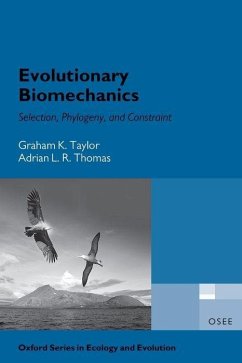Evolutionary biomechanics is the study of evolution through the analysis of biomechanical systems. Its unique advantage is the precision with which physical constraints and performance can be predicted from first principles. Instead of reviewing the entire breadth of the biomechanical literature, a few key examples are explored in depth as vehicles for discussing fundamental concepts, analytical techniques, and evolutionary theory. Each chapter develops a conceptual theme, developing the underlying theory and techniques required for analyses in evolutionary biomechanics. Examples from terrestrial biomechanics, metabolic scaling, and bird flight are used to analyse how physics constrains the design space that natural selection is free to explore, and how adaptive evolution finds solutions to the trade-offs between multiple complex conflicting performance objectives. Evolutionary Biomechanics is suitable for graduate level students and professional researchers in the fields of biomechanics, physiology, evolutionary biology and palaeontology. It will also be of relevance and use to researchers in the physical sciences and engineering.
Recent research in biomechanics is increasingly revealing a set of special cases where universal physical laws constrain the trajectories and, more controversially, even the endpoints of the evolutionary process. For the first time this book brings together a broad range of examples from the latest research in evolutionary biomechanics to examine this phenomenon.
Hinweis: Dieser Artikel kann nur an eine deutsche Lieferadresse ausgeliefert werden.
Recent research in biomechanics is increasingly revealing a set of special cases where universal physical laws constrain the trajectories and, more controversially, even the endpoints of the evolutionary process. For the first time this book brings together a broad range of examples from the latest research in evolutionary biomechanics to examine this phenomenon.
Hinweis: Dieser Artikel kann nur an eine deutsche Lieferadresse ausgeliefert werden.








